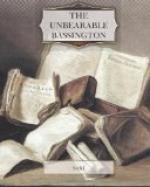In the third interval, as he gazed round at the chattering house, someone touched him on the arm. It was Lady Veula Croot.
“I suppose in a week’s time you’ll be on the high seas,” she said. “I’m coming to your farewell dinner, you know; your mother has just asked me. I’m not going to talk the usual rot to you about how much you will like it and so on. I sometimes think that one of the advantages of Hell will be that no one will have the impertinence to point out to you that you’re really better off than you would be anywhere else. What do you think of the play? Of course one can foresee the end; she will come to her husband with the announcement that their longed-for child is going to be born, and that will smooth over everything. So conveniently effective, to wind up a comedy with the commencement of someone else’s tragedy. And every one will go away saying ‘I’m glad it had a happy ending.’”
Lady Veula moved back to her seat, with her pleasant smile on her lips and the look of infinite weariness in her eyes.
The interval, the last interval, was drawing to a close and the house began to turn with fidgetty attention towards the stage for the unfolding of the final phase of the play. Francesca sat in Serena Golackly’s box listening to Colonel Springfield’s story of what happened to a pigeon-cote in his compound at Poona. Everyone who knew the Colonel had to listen to that story a good many times, but Lady Caroline had mitigated the boredom of the infliction, and in fact invested it with a certain sporting interest, by offering a prize to the person who heard it oftenest in the course of the Season, the competitors being under an honourable understanding not to lead up to the subject. Ada Spelvexit and a boy in the Foreign Office were at present at the top of the list with five recitals each to their score, but the former was suspected of doubtful adherence to the rules and spirit of the competition.




